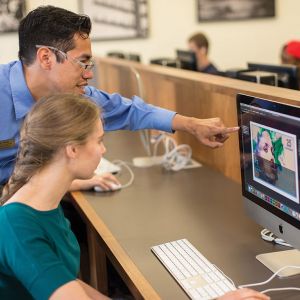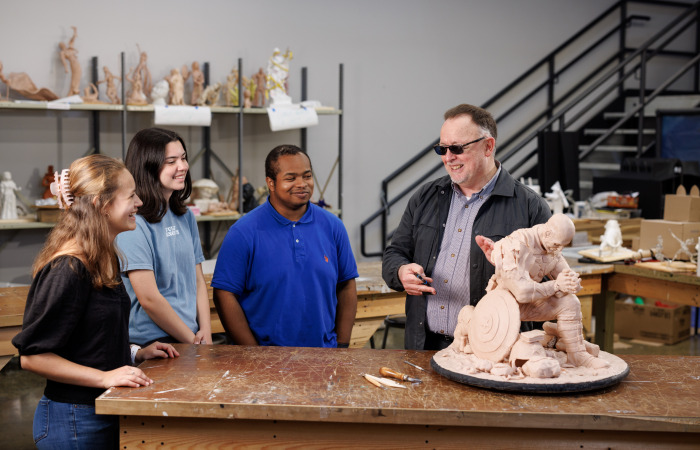
Jerry Falwell Library customer service specialist Isaac Arias assists Abigail Kouns with an Adobe program.
New partnerships with the world’s leading software and technology providers are opening doors for Liberty University students, faculty, and staff to use the most modern communication tools.
This fall, Liberty has given all residential students, as well as students in select online courses, free access to Adobe’s large suite of products, which includes software for graphic design, desktop and website publishing, and photo and video editing, as well as a host of Web apps. Across multiple disciplines, students are learning how to use these tools to create professional presentations, network with classmates and professors, and build their résumés.
Liberty is one of five higher education institutions hand-picked by Adobe to showcase its products. In turn, Adobe is using the feedback from these institutions to better tailor their products for the classroom.
Liberty signed an agreement with Adobe last spring, and the Information Technology (IT) department, along with faculty members, worked hard over the summer to prepare curriculum for the fall that would incorporate the Adobe programs.
Connie Allison, Liberty’s new director of teaching and learning technologies, said Liberty was chosen for many reasons.
“Adobe was looking for aggressive higher ed institutions that have the resources to really do something big,” she said. “Liberty’s technology is centrally managed, our programs are cutting-edge, we have a huge online but also residential enrollment, and we can move fast. We’re not afraid to try new things.”
Allison, who serves as a liaison between Liberty’s robust IT department and all academic programs, said Adobe is working to make its products applicable to more areas of study.
“Traditionally, coursework has included essays and papers, but Adobe knows that static text is not the only way to tell a story,” she said.
Now, students are learning to add charts, spreadsheets, videos, and interactive media components to their projects. And they’re learning to use the products across different platforms. They can edit a video in Adobe Premier on a desktop or use its counterpart for mobile devices, Premier Clip, a creative app that can sync with desktop software.
Adobe’s technology also goes a step further, connecting students and professors through a social network where they can reach a larger audience and receive critiques of their work.
Joshua Frejosky, director of IT communications, said students in many different programs will benefit.
“No matter what area of study or professional discipline, the skill to communicate ideas through various methods (print, video, digital imagery, Web, games, etc.) will help set them apart in their respective fields,” he said.
For example, science majors will learn to communicate the results of their research in more engaging ways, just as business majors will learn to create more visual presentations.
“By partnering with Adobe, we can ensure that we are training our students to communicate their vision, ideas, and knowledge in the most productive and far-reaching formats and mediums,” Frejosky said. “In this age of social media and digital consumption, the ability and variety of the message the student wishes to communicate is limited only by the student’s passion and imagination.”
Liberty’s College of General Studies plans to implement Adobe products in its general education 100-level English courses.
“Students will benefit greatly from learning these marketable skills in the first classes they take at Liberty — and it sets them up for more and better projects later on,” said Dr. Emily Heady, vice provost for undergraduate education and dean of the College of General Studies.
“It also provides us with some great research opportunities that we’ll use to guide our technology and curriculum developments going forward,” she added. “If we can understand how much and in what way using technology of this sort contributes to learning, we’ll be able to use it more strategically in the future.”
Cisco, one of the world’s leaders in telephone and video communications, has also partnered with Liberty to make its products accessible in an academic setting. According to Allison, Cisco is especially interested in Liberty because of its high volume of online students communicating over large distances.
The company is working with Liberty to boost “telepresence,” the digital means of simulating meetings that include a large number of people in multiple locations. This includes providing two-way live video feeds in meeting rooms, where people can not only interact, but also share and view digital reports and presentations. Cisco is also working to supply Liberty with its Show and Share high-end video repository that allows users to do extensive and efficient searches.
Adobe, Cisco, and Liberty aren’t the only businesses that will benefit from these partnerships. Every organization that uses this technology will be at an advantage when they hire a Liberty graduate.
“Here, we’re training students to use the technology, and they are taking that knowledge into the workplace,” Allison said. “They will be showing their employers what they can do with these tools; they will be ambassadors for these programs.”
Liberty’s IT department, in cooperation with the Jerry Falwell Library, is working to establish a central location where these new technologies can be demonstrated and taught to students and faculty. The new center will include areas for training and collaboration, and staff will offer on-site support.
The IT department has also been working to establish an Apple Authorized Campus Store in the coming months. While the school has provided educational discounts for computer software and hardware, this will be its first one-stop-shop where students can browse products, get advice on which ones are best suited for their chosen degree programs, and make purchases.




